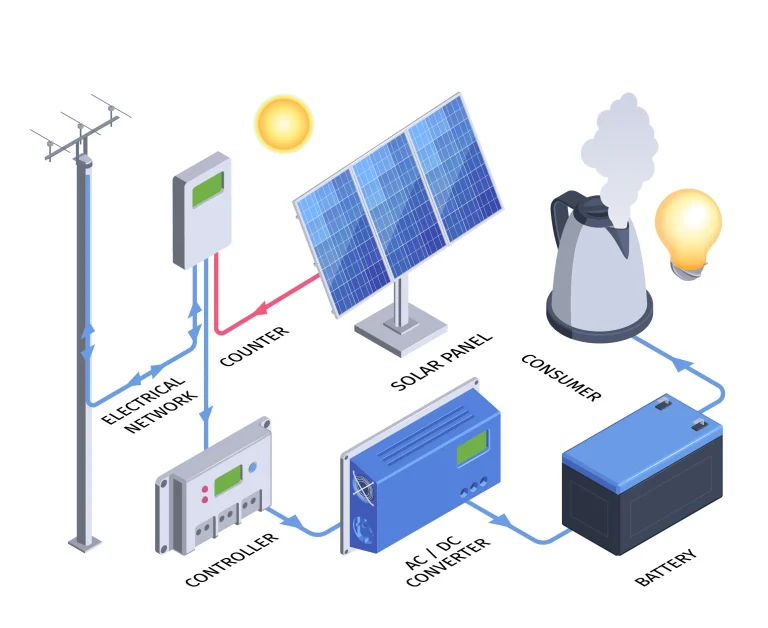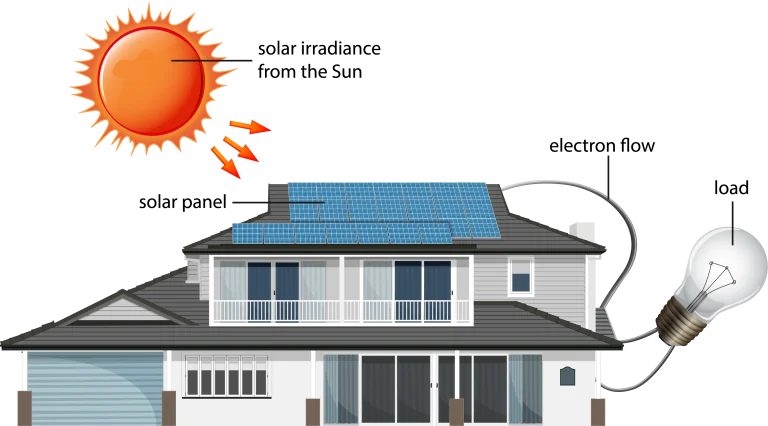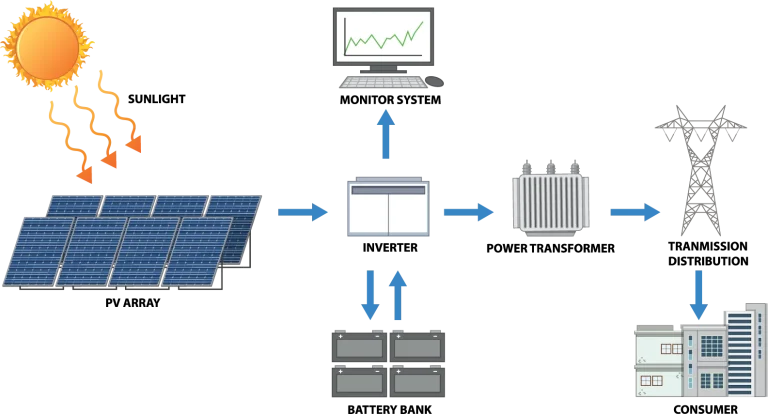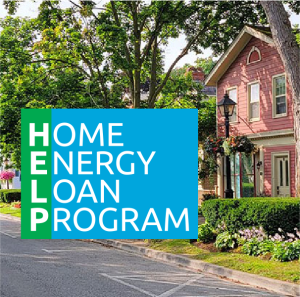Solar energy is a renewable energy and sustainable source of power that harnesses the sun’s energy to generate electricity.
It is a clean and environmentally friendly alternative to traditional fossil fuels, offering a solution to combat climate change and reduce carbon emissions. Solar energy systems utilize photovoltaic cells to convert sunlight into electricity, providing a reliable and cost-effective energy source for residential, commercial, and industrial applications.
Learn about solar energy through the content of this article.
Benefits of Solar Energy
solar power offers a multitude of benefits, making it a compelling choice for individuals, businesses, and communities looking to transition to a more sustainable energy source.
Some key benefits of solar energy include:
- Renewable and Sustainable:
Solar power is an abundant and inexhaustible resource, making it a sustainable alternative to finite fossil fuels. By harnessing the power of the sun, we can generate clean electricity without depleting natural resources or contributing to greenhouse gas emissions.
- Cost-Effective:
While the initial investment in solar panels and installation may seem significant, solar energy systems can lead to long-term cost savings. By generating your own electricity, you can reduce or even eliminate your reliance on grid power, resulting in lower utility bills over time.
- Energy Independence:
Solar power provides individuals and businesses with greater energy independence by allowing them to generate their own electricity on-site. This reduces dependence on external energy sources and insulates against fluctuations in energy prices.
- Environmental Benefits:
Solar power is a clean and environmentally friendly energy source that produces no greenhouse gas emissions or air pollutants during operation. By choosing solar power, individuals can reduce their carbon footprint and contribute to mitigating climate change.
- Versatility and Accessibility:
Solar energy systems can be installed on a wide range of structures, from residential rooftops to large-scale solar farms. This versatility makes solar energy accessible to a diverse range of users, regardless of location or energy needs.
Overall, the benefits of solar power extend beyond financial savings to include environmental sustainability, energy independence, and a greener future for generations to come.
Disadvantages of solar energy
While solar energy offers numerous benefits, there are also some disadvantages to consider:
- Intermittent Energy Production:
Solar energy production is dependent on sunlight, which means that energy generation can be inconsistent, especially during cloudy days or at night. This variability can pose challenges for meeting energy demands consistently.
- High Upfront Costs:
The initial cost of installing solar panels and related equipment can be significant, making it a barrier for some individuals or businesses to adopt solar energy. However, the long-term savings on energy bills and potential incentives can help offset these costs over time.
- Energy Storage Challenges:
Storing excess energy generated by solar panels for use during periods of low sunlight can be a challenge. While battery storage technology is improving, it can add to the overall cost of a solar energy system.
Despite these disadvantages, the continued advancements in solar technology and the increasing global focus on renewable energy sources make solar energy a promising and sustainable solution for meeting our energy needs in the future.
Click here for more information on solar panels and their pros and cons.
Types of Solar Energy Systems
There are several types of solar energy systems that harness the power of the sun to generate electricity. The most common types include:
- Photovoltaic (PV) Systems:
Photovoltaic (PV) systems play a pivotal role in the realm of solar power, serving as the cornerstone of harnessing sunlight and converting it into electricity. These systems consist of solar panels composed of photovoltaic cells that absorb sunlight and generate direct current (DC) electricity.
- Concentrated Solar Power (CSP) Systems:
CSP systems use mirrors or lenses to concentrate sunlight onto a small area, generating heat that is used to produce electricity. This technology is often used in large-scale power plants.
- Solar Water Heating Systems:
These systems use solar collectors to heat water for residential or commercial use. Solar water heating systems can be used for domestic hot water, space heating, or swimming pool heating.
- Solar Air Heating Systems:
Solar air heating systems use solar collectors to heat air, which can then be used for space heating or ventilation in buildings.
- Solar Thermal Power Systems:
These systems use solar power to generate electricity by heating a fluid to produce steam, which drives a turbine to generate power. Solar thermal power plants are typically used for large-scale electricity generation.
Each type of solar power system has its own advantages and applications, providing a range of options for harnessing the power of the sun to meet energy needs in a sustainable and environmentally friendly way.

How Solar Panels Work
Solar panels work by harnessing the sun’s energy through photovoltaic cells, which are made of semiconductor materials such as silicon. When sunlight hits the solar panels, the photons in the sunlight are absorbed by the semiconductor material, creating an electric current. This process is known as the photovoltaic effect.
The electric current generated by the solar panels is direct current (DC) electricity, which is then converted into alternating current (AC) electricity using an inverter. AC electricity is the type of electricity used in homes and businesses to power appliances and electronics.
The electricity generated by the solar panels can be used immediately to power devices or stored in batteries for later use. Excess electricity can also be fed back into the grid for credit or compensation through net metering programs.
Overall, solar panels work by converting sunlight into electricity through the photovoltaic effect, providing a clean and renewable source of energy for a wide range of applications.

Do solar panels work in autumn and winter when the weather is snowy and rainy?
Solar panels can still generate electricity when it is cloudy or during the winter, although their efficiency may be reduced compared to sunny days. While direct sunlight is ideal for optimal energy production, solar panels can still generate power from diffused sunlight that penetrates through clouds.
During the winter, solar panels can still produce electricity as long as they receive an adequate amount of sunlight. While shorter days and lower sun angles may impact overall energy production, solar panels can still be a viable source of renewable energy during the winter months.
It is important to note that the efficiency of solar panels may vary depending on weather conditions and the amount of sunlight available. However, advancements in solar technology, such as improved panel efficiency and energy storage solutions, have made solar power a reliable and sustainable option for generating electricity year-round, even in less than ideal weather conditions.
Solar Energy Production Across Different Geographical Areas
the potential of solar energy production can vary significantly in different geographical areas due to factors such as sunlight intensity, weather patterns, and geographic location.
Regions closer to the equator tend to receive more direct sunlight throughout the year, resulting in higher solar energy potential. On the other hand, areas with frequent cloud cover or long periods of darkness may have lower solar energy production potential. Additionally, the angle at which sunlight hits the Earth’s surface can also impact the efficiency of solar panels, with regions at higher latitudes experiencing less direct sunlight and therefore lower solar energy potential.
Furthermore, geographical features such as mountains, valleys, and bodies of water can affect the availability of sunlight and the feasibility of solar energy production.
For example, mountainous regions may experience shading or limited sunlight exposure, reducing the overall solar energy potential.
Conversely, coastal areas or regions with large bodies of water may benefit from more consistent sunlight and lower temperatures, enhancing the efficiency of solar panels. Overall, understanding the geographical characteristics of a specific area is crucial in assessing its potential for solar energy production and determining the most effective strategies for harnessing renewable energy sources.
For more information on the potential of solar energy in Canada, click here.
The Future of Solar Energy
The future of solar energy is promising, with continued advancements in technology and increasing adoption of renewable energy sources.
As the demand for clean and sustainable energy solutions grows, solar power is expected to play a significant role in meeting global energy needs and reducing carbon emissions.
As we look towards the future of energy sustainability, the role of solar power and renewable energy sources becomes increasingly vital. The potential for solar energy to revolutionize the way we power our world is immense, with advancements in technology and infrastructure paving the way for a cleaner and more efficient energy landscape.
From the development of innovative solar panels to the integration of energy storage solutions, the future of solar energy holds promise for a greener and more sustainable future. As we strive towards reducing our carbon footprint and combating climate change, the shift towards renewable energy sources like solar power is not just a choice but a necessity for a brighter tomorrow.

conclusion
In conclusion, solar power represents a promising and sustainable solution to the global energy crisis, offering a clean and renewable alternative to traditional fossil fuels. With advancements in technology and decreasing costs, solar power systems have become increasingly accessible to individuals, businesses, and communities around the world. The benefits of solar power, including reduced carbon emissions, energy independence, and cost savings, make it a compelling choice for transitioning towards a more sustainable future.
As the demand for clean energy continues to grow, the widespread adoption of solar power systems is crucial in mitigating the impacts of climate change and reducing our reliance on finite resources. By harnessing the power of the sun, we can create a more resilient and environmentally conscious energy infrastructure that benefits both present and future generations. Embracing solar power not only helps to combat climate change but also fosters innovation, economic growth, and a more sustainable way of living for all.
In order to determine the feasibility of investing in solar panels for long-term energy savings, it is highly recommended to conduct a comprehensive energy audit of your home. By undergoing a home energy audit, you will receive essential information that will help you prioritize energy-efficient upgrades for your residence.
Book Your Energy Audit
Home Energy Audit is the first step to apply for any energy retrofit rebate.
"*" indicates required fields














